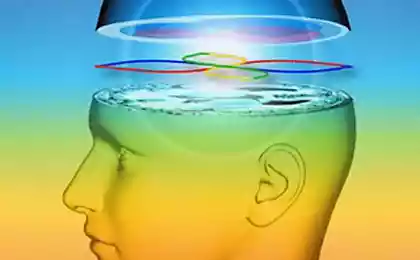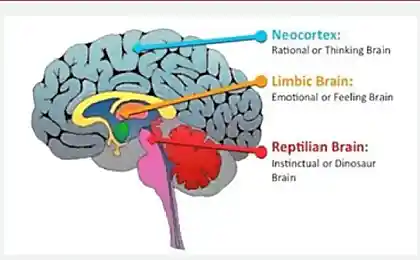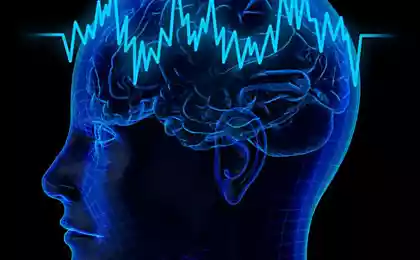615
Encephalasthenia or cerebral exhaustion
Encephalasthenia or tserebrastenicheskom syndrome - a condition of the nervous system characterized by fatigue, decreased performance, breach of attention
. In other words, encephalasthenia literally - brain exhaustion. The human nervous system is designed so that spent at vigorous activity supplies replenished during sleep and rest. When encephalasthenia this process will slow down and the brain "does not have time to rest," the consequence of which are the pathological symptoms of nervous exhaustion.

The disease can occur at any age, but more often than not this syndrome is diagnosed in children, especially in adolescents. The emergence and aggravation associated with increased loads and frequent stressful situations.
The main reasons tserebrastenicheskom syndrome should be sought in utero and during birth. This lack of oxygen and nutrients from mother to fetus, receiving a large amount of drugs during pregnancy, various infections, birth trauma and organic brain damage baby's brain. In adult pathology may develop after suffering a traumatic brain injury, stroke, surgical procedures under general anesthesia with a prolonged stay in conditions of hypoxia, severe illnesses.
Symptoms
encephalasthenia Depending on the predominant clinical manifestations are the following types tserebrastenicheskom syndrome:
1. Astenogiperdinamichesky:
fussiness;
irritation at the slightest pretext;
aggression (can go up even to the use of physical force);
restlessness;
physical activity.
2. Astenoadinamichesky or atenoapatichesky:
constant sleepiness, even after a normal night's sleep duration;
lethargy;
indifference;
indifferent to everything happening around;
laziness;
stiffness;
inactivity.
3. Astenodistimichesky or mixed version, which combines the features of other species. This is characterized by frequent changes of mood, a quick transition from apathy to aggression, tearfulness. Common symptoms:
headache;
dizziness;
nausea, vomiting;
disorders of the stomach and intestines (constipation, diarrhea unfounded);
vegetative symptoms: tremor of the eyelids, sweating skin;
poor tolerance of heat, atmospheric pressure drops.
Encephalasthenia has periods of exacerbation and remission, during which symptoms may disappear or at all, or be present at a minimum level. In some patients remission as such is not observed, and they feel the symptoms of exhaustion of the nervous system constantly. Exacerbations are clearly associated with the presence of trigger factors - changes in the usual daily routine, lack of sleep, stress, increased mental and physical stress, bad habits
. encephalasthenia Treatment
Since eliminate the direct cause encephalasthenia practically impossible, should strive to minimize the consequences of the disaster by improving the brain nerve cells stability and replenish their energy reserves.
For this purpose:
nootropic and neuroprotective (encephabol, Noofen, aktovegin);
Cardiovascular (vinpocetine, Sermion);
vitamin complexes (milgamma, komplivit).
Depending on the availability of certain manifestations prescribe symptomatic therapy - analgesics, sedatives, stimulants, antiemetics. But no medication will not help if a person does not eliminate the factors that exacerbate tserebrastenicheskom syndrome.
To prevent these factors is necessary:
lead a healthy lifestyle;
take breaks during work;
a full night's sleep;
smoking cessation, alcohol, strong tea and coffee;
often walking in the fresh air;
alternate mental work with physical.
Forecast for the future and disability
Forecast at encephalasthenia mostly favorable. Most children with the right amount of therapy and compliance with work and rest, as they grow older manifestations become less and less pronounced and may even disappear.
With serious brain damage or improper treatment of a high probability of severe mental disorders. In this case, can be assigned a disability I, II or Group III, depending on the severity of symptoms and the ability to engage in employment.
By itself, the diagnosis encephalasthenia is not a ground for exemption from military service. It is important cause of the disease is present and at the moment the physical and mental symptoms. If, for example, was a severe traumatic brain injury or a birth, there is a change in the survey (MRI of the brain, tested by a psychiatrist), the question of validity to the service is solved individually.
. In other words, encephalasthenia literally - brain exhaustion. The human nervous system is designed so that spent at vigorous activity supplies replenished during sleep and rest. When encephalasthenia this process will slow down and the brain "does not have time to rest," the consequence of which are the pathological symptoms of nervous exhaustion.

The disease can occur at any age, but more often than not this syndrome is diagnosed in children, especially in adolescents. The emergence and aggravation associated with increased loads and frequent stressful situations.
The main reasons tserebrastenicheskom syndrome should be sought in utero and during birth. This lack of oxygen and nutrients from mother to fetus, receiving a large amount of drugs during pregnancy, various infections, birth trauma and organic brain damage baby's brain. In adult pathology may develop after suffering a traumatic brain injury, stroke, surgical procedures under general anesthesia with a prolonged stay in conditions of hypoxia, severe illnesses.
Symptoms
encephalasthenia Depending on the predominant clinical manifestations are the following types tserebrastenicheskom syndrome:
1. Astenogiperdinamichesky:
fussiness;
irritation at the slightest pretext;
aggression (can go up even to the use of physical force);
restlessness;
physical activity.
2. Astenoadinamichesky or atenoapatichesky:
constant sleepiness, even after a normal night's sleep duration;
lethargy;
indifference;
indifferent to everything happening around;
laziness;
stiffness;
inactivity.
3. Astenodistimichesky or mixed version, which combines the features of other species. This is characterized by frequent changes of mood, a quick transition from apathy to aggression, tearfulness. Common symptoms:
headache;
dizziness;
nausea, vomiting;
disorders of the stomach and intestines (constipation, diarrhea unfounded);
vegetative symptoms: tremor of the eyelids, sweating skin;
poor tolerance of heat, atmospheric pressure drops.
Encephalasthenia has periods of exacerbation and remission, during which symptoms may disappear or at all, or be present at a minimum level. In some patients remission as such is not observed, and they feel the symptoms of exhaustion of the nervous system constantly. Exacerbations are clearly associated with the presence of trigger factors - changes in the usual daily routine, lack of sleep, stress, increased mental and physical stress, bad habits
. encephalasthenia Treatment
Since eliminate the direct cause encephalasthenia practically impossible, should strive to minimize the consequences of the disaster by improving the brain nerve cells stability and replenish their energy reserves.
For this purpose:
nootropic and neuroprotective (encephabol, Noofen, aktovegin);
Cardiovascular (vinpocetine, Sermion);
vitamin complexes (milgamma, komplivit).
Depending on the availability of certain manifestations prescribe symptomatic therapy - analgesics, sedatives, stimulants, antiemetics. But no medication will not help if a person does not eliminate the factors that exacerbate tserebrastenicheskom syndrome.
To prevent these factors is necessary:
lead a healthy lifestyle;
take breaks during work;
a full night's sleep;
smoking cessation, alcohol, strong tea and coffee;
often walking in the fresh air;
alternate mental work with physical.
Forecast for the future and disability
Forecast at encephalasthenia mostly favorable. Most children with the right amount of therapy and compliance with work and rest, as they grow older manifestations become less and less pronounced and may even disappear.
With serious brain damage or improper treatment of a high probability of severe mental disorders. In this case, can be assigned a disability I, II or Group III, depending on the severity of symptoms and the ability to engage in employment.
By itself, the diagnosis encephalasthenia is not a ground for exemption from military service. It is important cause of the disease is present and at the moment the physical and mental symptoms. If, for example, was a severe traumatic brain injury or a birth, there is a change in the survey (MRI of the brain, tested by a psychiatrist), the question of validity to the service is solved individually.
What's wrong with me? Or why I'm crazy, nutty, no unnecessary idiot
Restless legs syndrome: the causes of disease and specific treatment























